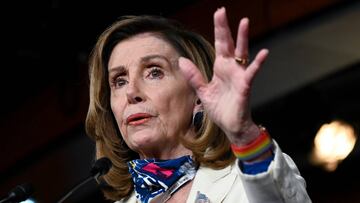Second stimulus bill has passed: what happens now?
A stimulus bill passed Thursday in the House, but talks continue. What does it mean for you; when could payment arrive and what's in the bill?

A stimulus bill has been passed in the House of Representatives. But it's far from over. Negotiations on a separate, bipartisan bill are still ongoing. How does this affect the possible timeline for payment and what are the details of the bill?
JUST PASSED: Heroes Act 2.0.
— Congresswoman Chellie Pingree 🇺🇸 🇺🇦 (@chelliepingree) October 2, 2020
This compromise bill provides desperately needed help to schools, small businesses, restaurants, performance spaces, and local governments.
Our bill also renews federal unemployment payments through next January & provides a 2nd stimulus check. pic.twitter.com/pmhVyPmnhi
The bill that passed yesterday is being called the HEROES Act 2.0 and includes $600 federal unemployment benefits and aid for restaurants and airlines. The Democrats originally proposed this bill in the spring. Crucially, the bill is not law.
If an agreement is met on the separate bipartisan bill, a stripped back HEROES bill for which talks stalled and then were reignited again this week as the election draws ever closer, it could mean that another bill is voted on in both the House and the Senate.
- Second stimulus check: update on US coronavirus relief bill
- Trump $1.8 trillion stimulus plan: what unemployment benefits and checks does it include?
- $300 weekly unemployment benefits: situation in states across the US
- Second stimulus check: could any new payment be more than $1,200?
What would it take for HEROES 2.0 to become law?
The HEROES Act 2.0 bill has now passed in the House, but would have to pass in the Senate, which is unlikely at this stage and then it still requires the President’s signature.
What we do know is that both parties are keen to strike a deal, agreeing on the need to provide a second round of stimulus checks to US citizens hard-hit by the economic effects of the Covid-19 pandemic.
What are details of negotiations on stimulus bill?
There’s broad consensus on a direct payment to all qualifying citizens of $1,200, but little else in the detail that’s agreed on by both parties. Both Republicans and Democrats are keen to get checks out to Americans before the election on November 3.
It is thought that the final package will eventually fall somewhere between the amounts laid out in HEROES and HEALS, in line with the $2.2 trillion provided by the CARES Act.
A sticking point in negotations is that Democrats want to provide $600 per week on top of state benefits just like the CARES Act did in March. Republicans don’t want to provide a penny more than half that, just $300. The Problem Solvers proposal suggests a figure for $450 for the first 8 weeks with provision for an increase afterwards.
Earlier this week, Pelosi was ‘hopeful’ that an accord could be met this week on the bill.
Mnuchin too expressed hope in a conference this week that an agreement could be reached; “I say we’re going to give it one more serious try to get this done and I think we’re hopeful that we can get something done…I think there is a reasonable compromise here.”
How much could I get in stimulus payment?
Who would qualify for a second stimulus check? Pelosi, Mnuchin agree on payments as House prepares to vote on bill https://t.co/EAhu24S09V
— Newsweek (@Newsweek) October 1, 2020
The amount will vary depending on your circumstances. Here’s a handy calculator to give you an estimate of how much you might receive.
When could checks start to be sent out?
The House was scheduled to recess no later than 2 October so members can campaign at home for re-election on 3 November. But, echoing Pelosi, House Majority Leader Steny Hoyer said lawmakers will be on indefinite standby, with 24 hours’ notice of any vote on a coronavirus aid bill if a deal is reached.
Related stories
Even if an agreement between Pelosi and Mnuchin is made today on the bipartisan bill, it will still take some time to firm up all the details and hold passing votes in both the House and the Senate.
According to CBS, these are the possible timelines for next steps:
- If the House can pass a final bill this Friday (October 2) and the Senate the following Monday (October 5), the president could sign as early as Tuesday (October 6). Direct deposits would start going out the Week of October 12, and checks would start going out the week of October 19.
- If the House can pass a final bill next Friday (October 9) and the Senate the following Monday (October 13), the president could sign as early as Tuesday (October 15). Direct deposits would start going out the Week of October 19, and checks would start going out the week of October 26.
- If the House can pass a final bill on Friday (October 16) and the Senate the following Monday (October 19), the president could sign as early as Tuesday (October 20). Direct deposits would start going out the Week of October 26, and checks would start going out the week of November 2.


